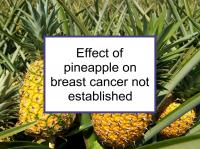Pineapple (Ananas comosus) flesh is an excellent dietary source of bromelain and a very good source of manganese and vitamin C. Pineapple also contains some beta-carotene, ellagic acid, fiber, and gallic acid. Pineapple and pineapple extract have been reported to have antioxidant, anti-inflammatory, and antithrombotic properties.
Bromelain and cancer
Bromelain, a complex mixture of proteolytic enzymes, has been reported to have proapoptic, anti-invasive and anti-metastatic properties. Bromelain is found in the flesh (especially of immature fruit), skin and stem of the pineapple plant. Most of the bromelain used in studies has been extracted from the stem, which has been shown to have stronger chemopreventive activities than that found in ripe pineapple flesh.
Bromelain has been demonstrated to inhibit the growth of human melanoma cells in the laboratory. Bromelain treatment has also been demonstrated to inhibit mouse skin cancer development, apparently by modulating cancer-related cell signaling cascades. Feeding with bromelain as part of the diet has been shown to reduce lung metastasis in mice implanted with lung cancer cells. Bromelain has also been demonstrated to reduce glioma cell adhesion, migration, and invasion.
Breast cancer-related effects of eating pineapple
There have been no population studies focusing on possible links between pineapple consumption and the risk of breast cancer. Pineapple has a relatively low micronutrient content compared to many other fruits and contains relatively low levels of most compounds that have been strongly associated with lower risk of breast cancer. Bromelain and vitamin C are the most abundant chemopreventive compounds in pineapple.
Bromelain and breast cancer
In one experiment in which mice were implanted with various types of human tumor cells, bromelain was found to increase the survival of mice with breast cancer, leukemia, Ehrlich ascites carcinoma, and lung cancer (but not melanoma).
Bromelain has been shown to have antiproliferative effects in hormone receptor positive (ER+/PR+) and triple negative (ER-/PR-/HER2-) breast cancer cells. Bromelain has also been found to induce apoptosis (programmed cell death) in ER+/PR+ cells in dose-dependent manner.
In addition, bromelain has been demonstrated to enhance the anti-tumor effects of cisplatin in triple negative breast cancer cells, as well as in a mouse model of breast cancer. Bromelain also has been shown to protect against cisplatin-induced ocular toxicity. Furthermore, bromelain has been reported to sensitize HER2+ cells to trastuzumab (Herceptin) and to sensitize breast cancer cells to radiotherapy while protecting normal cells from radiation's harmful effects.
Bromelain has been reported to be a potent inhibitor of cytochrome P450 2C9 (CYP2C9). While cytochrome CYP2C9-mediated interactions may cause an enhancement in the efficacy of some drugs, it has been demonstrated to reduce the metabolism of other drugs, including tamoxifen.
Vitamin C and breast cancer
High intakes of fruits and vegetables rich in vitamin C have been found to be associated with lower breast cancer risk. Vitamin C appears to act synergistically with other nutrients in the diet to oppose cancer. Vitamin C has been found to be cytotoxic against ER+/PR+ and triple negative breast cancer cells. In addition, vitamin C at low doses has been demonstrated to enhance the treatment effects of cisplatin in ER+/ER+ breast cancer cells.
Additional comments
Hot pineapple water (pineapple-infused water) has been proposed to kill cancer cells, but we have found no academic studies that support using hot pineapple water or hot pineapple juice as a cancer treatment.
Consumers of pineapple juice should avoid canned varieties (unless BPA-free), and those with added sugar, including high-fructose corn sugar. Even unsweetened pineapple juice has a high glycemic index and should be limited.
Sources of information provided in this webpage
The information above, which is updated continually as new research becomes available, has been developed based solely on the results of academic studies. Clicking on any of the underlined terms will take you to its tag or webpage, which contain more extensive information.
Below are links to 20 recent studies concerning this food and its components. For a more complete list of studies, please click on pineapple.
